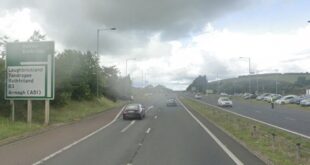Tens of thousands of National Health Service (NHS) nurses will strike again Tuesday, after the first such action in British history was taken last Thursday. They will be followed by more than 10,000 ambulance workers Wednesday.
Health workers are fighting a massive real-terms pay cut imposed by the Sunak government, an average nominal rise of 4 percent and 10 percent below the RPI rate of inflation. Abysmally low pay throughout the NHS has contributed to crippling staff shortages, leaving staff overworked to the point of exhaustion and the health service in a state of permanent crisis.
The strikes take place despite the efforts of the trade union bureaucracy to reach a sellout agreement with the government. Union leaders have made clear their reluctance to authorise action. Royal College of Nursing (RCN) General Secretary Pat Cullen commented before last week’s strike, “We are acting with a very heavy heart.” She told the Times she joined the RCN “rather than another health service union because of its ‘no-strike policy’.”
Unison’s head of health Sara Gorton added, “Ambulance staff and their health colleagues don’t want to inconvenience anyone”, GMB national secretary Rachel Harrison, said of NHS staff, “The last thing they want to do is take strike action.”
This apologetic tone throws the health workers into a defensive posture. It is wildly out of step with sentiment in the working class, which overwhelmingly backs NHS workers. Public support is so strong that some Conservative MPs publicly broke ranks with the government, suggesting Prime Minister Rishi Sunak and Health Secretary Steve Barclay reopen pay talks.
This wobble was ignored by Sunak and Barclay, who reiterated that there would be no further discussion on pay following a meeting of the COBRA contingencies committee that finalised plans to use 600 army personnel to drive ambulances Wednesday, with an additional 600 troops planned for use to replace striking border guard and customs officers on Friday.
The last thing the union bureaucracy wants is to mobilise mass popular sentiment behind a powerful strike that could serve as a spearhead to the broader strike wave in the UK’s “winter of discontent” and the focus for a fight against the illegitimate Tory government and its austerity agenda.
Large swathes of workplaces were excluded from the dispute before it even began after failing to meet balloting thresholds—mandated by anti-strike laws—upheld by the union bureaucracy. The RCN then restricted action to only half the locations where the threshold was crossed.
According to the Times, ultimately “Only a tenth of the 100,000 nurses eligible to strike did so, with union bosses expressing concern ‘about hospitals that verged on bullying to get nursing staff to work’.”
Instead of organising action, the union leaders are focussing all their efforts on securing a rotten deal in backroom discussions with the government. Last Thursday’s strike began under the shadow of an RCN surrender offer the weekend before, when the union promised to call the action off on the sole condition that the government attend talks and discuss pay.
These pleas have continued. Cullen gave an interview to the Times published Friday saying, “My message to the secretary of state is he can stop day two of the strike if he gets into a room this time…”
Harrison said, “The government could stop this strike in a heartbeat—but they need to wake up and start negotiating on pay.”
Unite union General Secretary Sharon Graham implored the government, “Ministers need to give themselves a shake and get into serious pay talks or see this strike spread next week.”
Graham and Gorton raised the deals struck in Scotland with the Scottish National Party administration as an example of the way forward, with Graham arguing, “The government there came back to the negotiating table, made a new offer and the strikes were cancelled.”
Planned ambulance strikes in Scotland were called off by Unison and Unite after pushing through an average 7.5 percent pay deal, roughly half the rate of inflation. The RCN and Royal College of Midwives are organising no action in Scotland while they ballot their members on the same offer.
Gorton cheered,“Ministers in Scotland have done what the Westminster government is stubbornly refusing to do. That’s talk to health unions, put improved wage offers on the table and avert strikes across the NHS.”
The government’s message has not changed one iota as a result of such pleading. Barclay wrote in the Mail on Sunday that it “simply cannot afford the 19% pay hike for nurses that the RCN is demanding.”
The government can be so belligerent in the face of mass working class opposition because it has the measure of the trade unions. The Tories believe the longer they wait, the more grovelling the terms of surrender the bureaucracy will sign up to.
The Times reported that Cullen had made clear “the demand for a wage rise five percentage points above inflation was ‘a starting point’, in the clearest hint that her union would settle for significantly less if Barclay agreed to talk ‘seriously and respectfully’ about nurses’ pay.”
Not even the use of the armed forces will stir the union apparatus to action. This is such a potentially explosive move that the Chief of the Defence Staff, Admiral Sir Tony Radakin, told the Telegraph that it would be “slightly perilous” to consider the military “spare capacity” for striking workers. Contrast this with Cullen, who shrugged the deployment off as “another example of the whole macho approach”.
A bureaucracy that will not organise a fight to keep pay level with inflation will of course do nothing to save the NHS and social care from the collapse threatened by a multi-hundred-billion-pound funding shortfall and the impact of a continuing pandemic.
Success depends on the adoption by NHS workers of a socialist perspective—including guaranteed high quality, free healthcare for all and an end to its accelerating privatisation—and the building of a new leadership. A genuine struggle against the Tory government demands that they take the fight into their own hands. Rank-and-file committees must be formed in every NHS workplace, dedicated to mobilising a unified movement of the millions of workers throughout the UK and internationally now coming into struggle against the same pro-war, pro-austerityagenda as that pursued by Britain’s Tories.
As the Socialist Equality Party explained in its December 14 statement, “For a general strike to back nurses’ fight to defend the NHS from UK Tory government: Build rank-and-file committees!”, the NHS strikes confirm “that the struggle against the worst cost-of-living crisis in living memory brings workers into head-on confrontation with the capitalist state apparatus and a government intent on making them pay for the pandemic bailout of the major corporations, the escalating war against Russia in Ukraine and the economic crisis produced by rising oil, gas, mineral and food prices and the profiteering of the major corporations.
“It raises point blank the necessity to organise a general strike to bring down the Conservative government, which is intent on destroying the NHS and smashing the strikes now hitting the health service, rail, Royal Mail, education and other key sectors.
“But organising such action can only proceed in a political and organisational struggle against a trade union bureaucracy intent on isolating and sabotaging every one of these struggles, and a Labour Party that works in tandem with the Tories on behalf of the corporations and the banks.”
Source link



